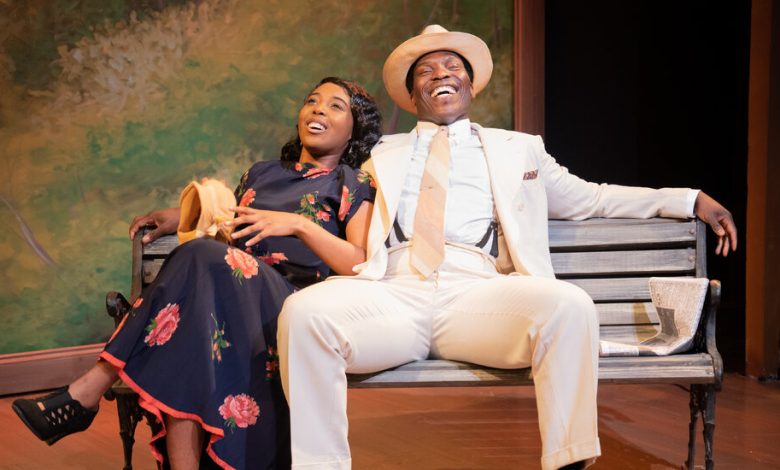Review: In Eulalie Spence’s Harlem, the 1920s Come to Life

W.E.B. Du Bois and the playwright Eulalie Spence had their differences, foremost among them that Du Bois advocated evangelically political Black theater “by us, for us, about us, and near,” which she publicly disagreed with in a 1928 essay, insisting on the importance of theater as entertainment.
“She’s Got Harlem on Her Mind,” an evening of three of Spence’s one-acts, directed by Timothy Johnson and presented by the Metropolitan Playhouse, serves as another rebuttal to Du Bois. Each roughly 30-minute work, a slice of Black life packed with gender and class politics, is either a minute comedy punctuated with a tragic denouement, or a tragic mini-drama that resolves with breezy humor.
In the first, “The Starter,” a young Black couple try to figure out their future on a park bench only to find themselves at odds when the topics of money and marital duty enter the conversation. In “Hot Stuff,” a woman running a numbers operation is forced to pay up for her shady behavior. And in “The Hunch,” a naïve young woman finds out how much she’s gambling with her love life on the night before her wedding day.
A cast of eight performs the plays — all set in 1920s Harlem, and snazzily costumed by Jevyn Nelms in tiered fringe skirts and raining pearls — on the Metropolitan’s tiny thrust stage. A framed painting of Harlem, as seen from overhead, with the view of the buildings overtaken by the treetops, is the stage backdrop (set design by Vincent Gunn). And later, a few antique pieces stand in for the sparse furnishings of a rented room in a boarding-house in one play and a gambler’s home in another. Which is to say there’s nothing showy about this production, which neatly ties the plays together thematically, each one spotlighting a Black woman forced to face her economic prospects (or lack thereof) while juggling the societal expectations that she be a well-kept, well-behaved married woman.
Déja Denise Green, Raven Jeannette and Jazmyn D. Boone shine as the three featured women, Jeannette in particular bringing both a stiff-backed brazenness and pathos to her cheating and conniving Fanny King in “Hot Stuff” and a spurned wife named Lucinda in “The Hunch.”
Johnson smartly double- or triple-casts most of the actors to show off their versatility, so Dontonio Demarco follows a brief appearance as an abusive husband with one as a gallant suitor, and Terrell Wheeler plays a man who is cheated, then a man who’s a cheat. SJ Hannah, on the other hand, serves two believable shades of sleaze, a mischievous joker’s grin stretched across his face the whole while. Not everyone gets top billing; Spence’s plays each have side characters that could be condensed, combined or cut.
When it comes to Spence’s set-up and gradual build to her protagonists’ eventful though abbreviated arcs and final emotional turns — usually as understated as a glance and a sigh — the director often seems to be at a loss. The production misses some beats of slowness, stillness and silence, the steady escalation of tension and humor from one line to the next. And though the three plays are already in perfect conversation, Johnson makes an unnecessary show of connecting and introducing them with the cast humming, clapping and stomping to original a cappella music when a simple instrumental interlude would do.
Du Bois may have wanted propaganda from his contemporaries on the stage, but Spence’s plays have a different — though still Black, still political — agenda in mind: the extraordinary, bittersweet every day of the people north of 110th Street.
